AI for Customer Relationships – DreamHost
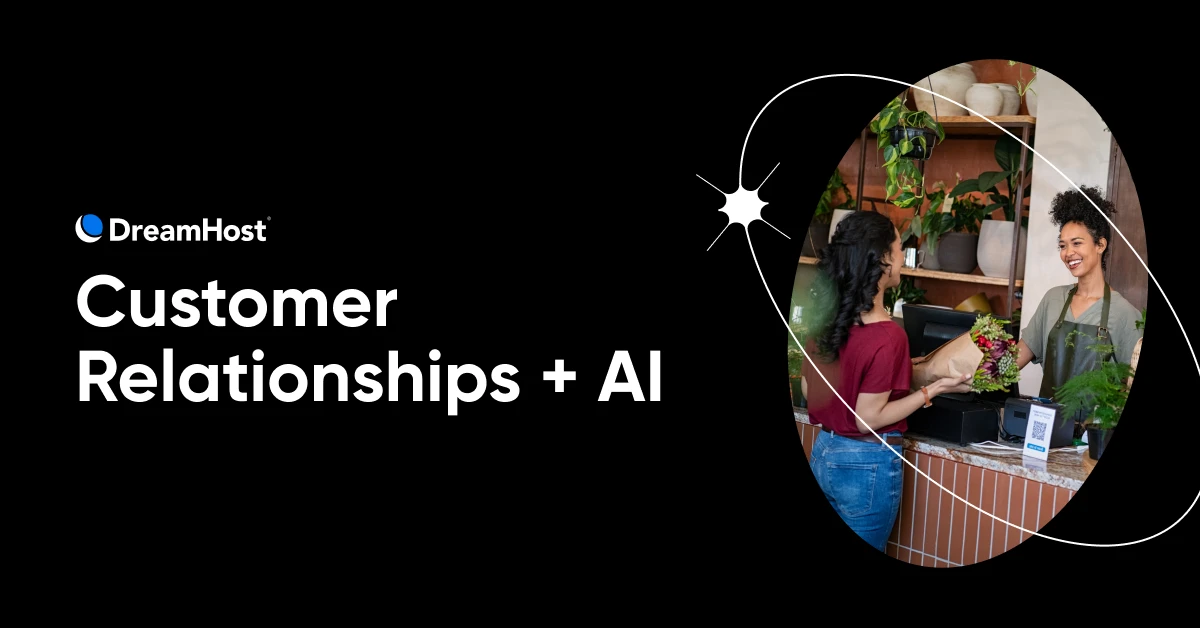
As a small business owner, you’ve probably had days like this: you start the day by shipping out some orders. Then you answer a few customer questions. Then sit down to queue up some social media posts.
But more customer queries are coming in, and they need answering. Oh, and there are returns to process. And more orders to ship out. And your website needs updating. And fine-tuning your marketing plan —that’s been on your to-do list, but customers have to come first!
When you own a business, you want to give every single person who interacts with your brand a genuine, helpful experience, but there are only so many hours in the day. If you’ve ever wished you had an extra set of hands to help build and maintain customer relationships, you’re not alone. But what if you don’t need extra hands —just an extra…neural network?
Artificial intelligence (AI) might be just what you need to help bolster your customer relationships and free up more of your valuable time for strategic thinking and growing your business. Contrary to what you might have heard, AI isn’t here to replace you. Instead, it can handle repetitive tasks, sift through data to find hidden insights, and free you up to focus on the human side of your business: connecting with your audience in a meaningful way.
Why Customer Relationships Matter More Than Ever
There’s a big difference between customer service (which typically focuses on handling immediate problems or questions) — and customer relationships, which encompass an ongoing, long-term connection. Customer service is about being responsive; customer relationships are about fostering trust and loyalty over time.
Customer relationships are proactive, not just reactive. They involve nurturing, engaging, and consistently adding value to your customers.
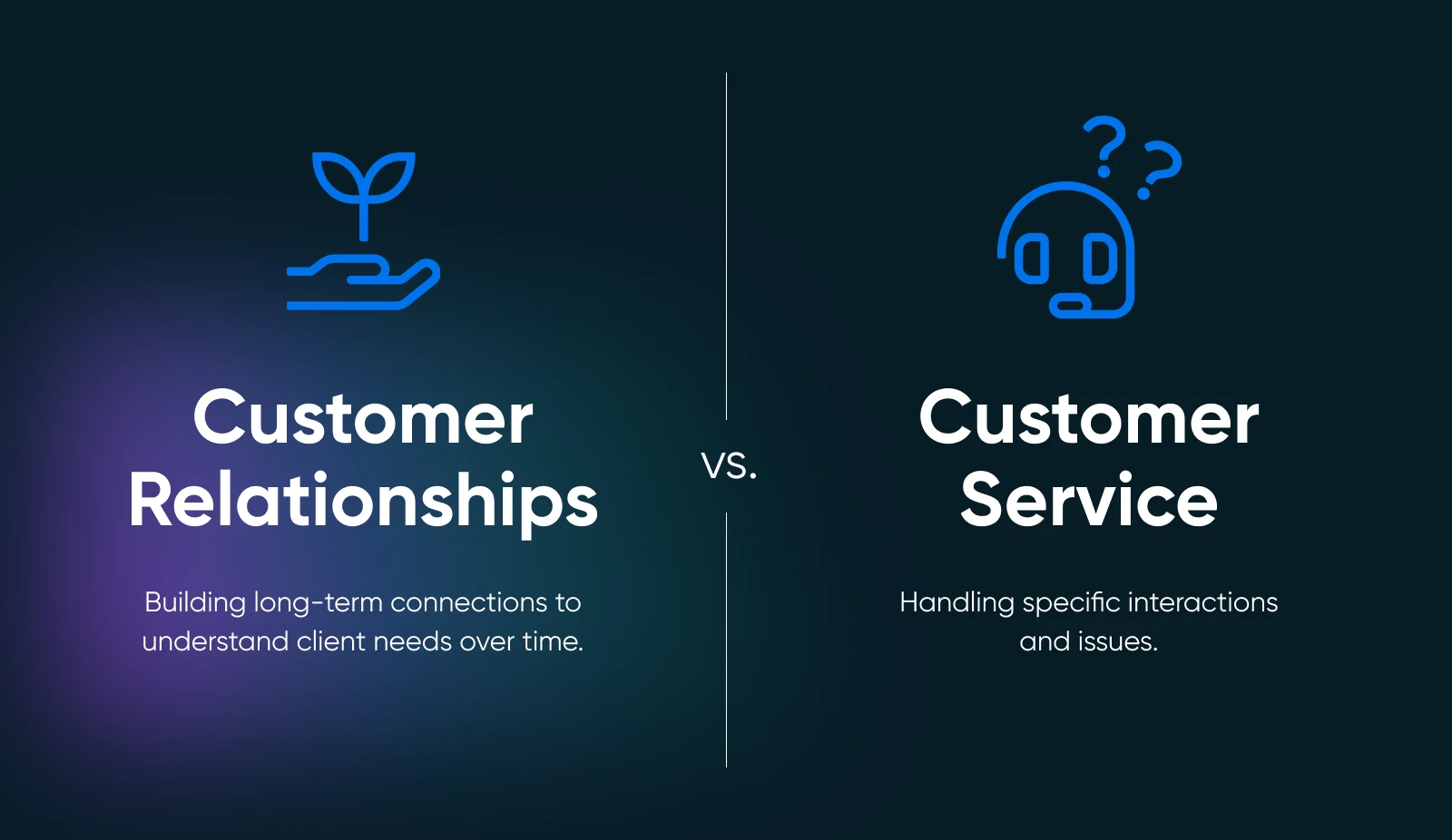
And while that may sound like a lot of effort, it’s well worth it. According to Forbes, it costs 5x more to acquire a new customer than to keep an existing one.
The math clearly supports building loyalty. You save money while giving yourself a better chance at long-term profitability.
For a large company, customer relationships can sometimes feel transactional — throw some marketing dollars at a campaign and hope for the best. But for small businesses, building rapport and trust can be a powerful differentiator. You often have a more personal brand, and you know your customers by name. When someone feels seen and valued, they’re more likely to stick around, refer friends, and become brand advocates.
The catch? Small businesses are resource-constrained. That’s where AI can step in, helping you streamline and enhance your relationships, and letting you offer big-brand service on a small-business budget.
The takeaway: Customer relationships aren’t just a feel-good exercise; they’re a smart strategy that fuels growth. By emphasizing loyalty and retention, you can keep your operations sustainable and your customers happy.
How AI Can Help Strengthen Customer Relationships
There are many ways AI can help you on the road to better customer relationships.Here are a few to consider:
Personalization at Scale
One of AI’s superpowers is analyzing vast amounts of data to uncover patterns a human might miss. This data crunching allows for better personalization. For example, sending marketing emails that recommend products based on someone’s past purchases or customizing your website’s landing page to match a returning customer’s interests.
Say you have an online boutique that sells handmade clothes. AI can keep track of a customer’s style preferences and shopping habits to suggest new arrivals they’ll actually want, rather than blasting a mass email with the same promo to everyone on your email list.
That personal touch can feel like a concierge service, even when you’re managing hundreds or thousands of customers.

Proactive Problem-Solving
Have you ever wanted to know which customers might be on the verge of canceling a subscription or which products are about to skyrocket in demand? Predictive analytics can help with that. They use AI to look at historical data, identify trends, and even anticipate future challenges.
For example, advanced chatbots can spot common questions that lead to refunds and proactively offer solutions before a customer even thinks to ask. This kind of proactive support can keep small issues from turning into full-blown crises.
Round-the-Clock Accessibility
These days, the world is always on. It’s not unusual for customers to ask questions at 2 a.m. — or during your busiest days when you have zero time to answer them immediately. AI-driven tools like chatbots can jump in with 24/7 availability, offering instant responses to frequently asked questions and basic troubleshooting.
According to IBM, chatbots can reduce customer service costs by up to 30%. This suggests that a chatbot doing front-line work can make life easier for both you and your customers.
Balancing Scale With Authenticity
Don’t worry: leaning on AI doesn’t mean your business will lose its personal charm. AI takes care of repetitive tasks, freeing up more time for you (or your team) to engage in genuine, human conversations. Tools like chatbots and conversational AI are excellent for handling common customer inquiries, directing users to relevant resources, and even detecting sentiment to guide responses.
However, skepticism toward AI in customer service is widespread, and for good reason. Many users have experienced poorly implemented chatbots, impersonal responses, and a lack of meaningful engagement. Oversight and authenticity are crucial in overcoming these challenges. It’s not about replacing humans but equipping them with the tools to provide faster, more personalized service while maintaining the warmth that makes a lasting impression.
This sentiment is echoed in customer discussions, like this Reddit comment from a business owner:
Commentbyu/ticaragua from discussioninshopify
Statements like this highlight the need to balance automation with a personal touch. AI should enhance your customer service efforts, not undermine them. By using AI as a supportive tool rather than a full replacement, businesses can scale efficiently while keeping their relationships authentic and meaningful.
Not all AI solutions are created equal. Below, we’ve broken down some of the most common tool categories and how they can help your business —but not every business needs all (or even any) of these tools.
Think about your specific challenges first: is it customer support? Data organization? Social media feedback? Then, match them with the right AI tool.
Chatbots and Conversational AI
Chatbots take on immediate customer inquiries, direct customers to relevant resources, and even process orders. More advanced conversational AI can recognize context, detect sentiment, and seamlessly switch customers to a human rep when necessary.
Instant response times mean happier customers. Plus, your team is freed from repetitive tasks like answering “Where is my order?” for the tenth time that day.
Popular Tools To Try:
- Zendesk Chat: Integrates neatly with existing Zendesk support systems and offers multilingual support for global audiences.
- Intercom: Known for its user-friendly interface and robust customer data platform, helping you manage chats and email campaigns together.
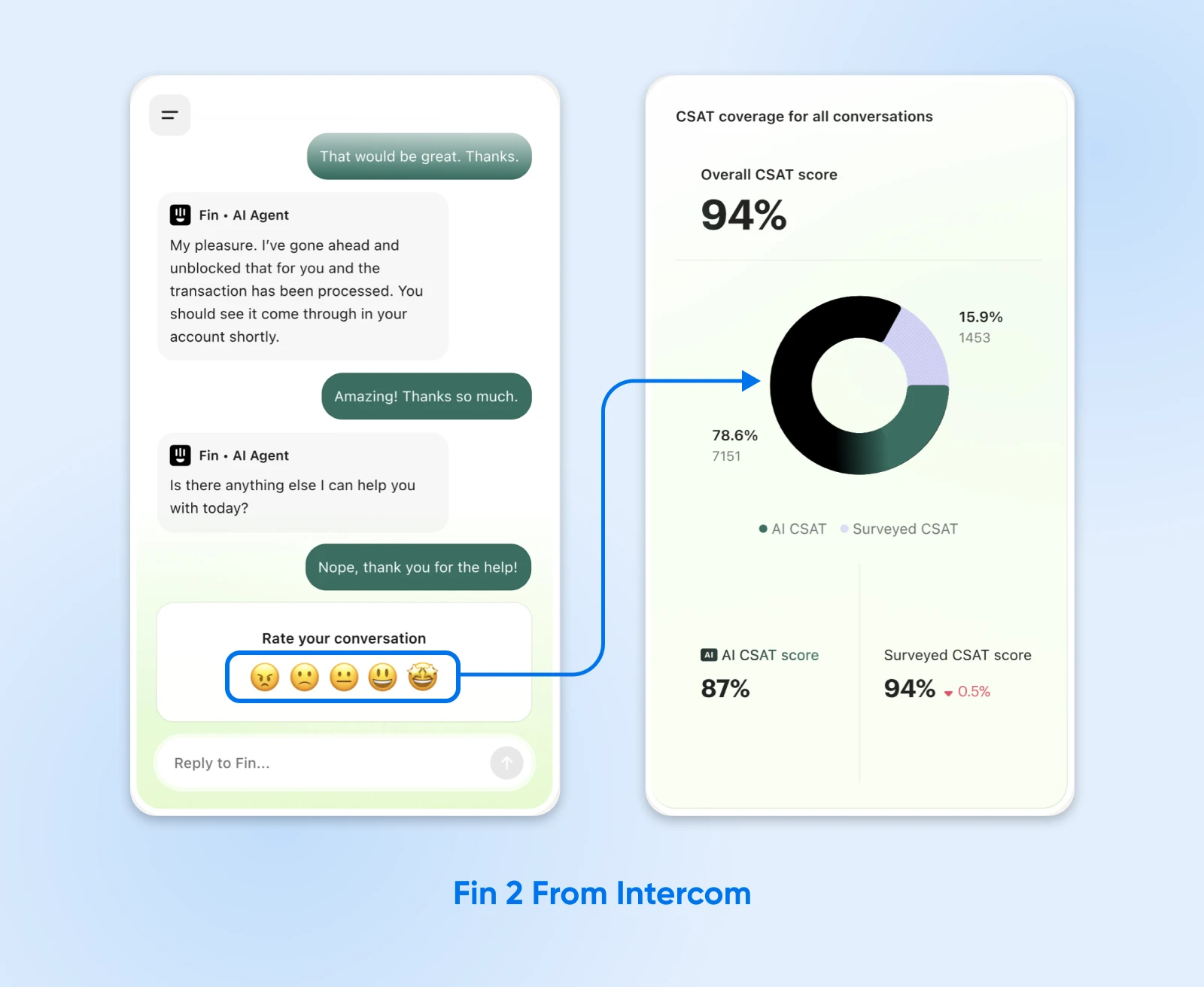
Tips:
- Start with a simple chatbot focused on FAQs or order tracking. A low-risk approach helps you test the waters.
- Regularly review chatbot transcripts to make sure the AI “voice” aligns with your brand’s tone. Look for a chatbot you can train with your brand’s marketing materials, so it sounds just like you.
AI-Powered CRM Platforms
CRMs infused with AI can automate data entry, create smart customer segments, and offer insights about upcoming sales opportunities. They help you organize customer data more efficiently than a jumble of spreadsheets ever could.
Better data organization via a CRM means you never lose track of who’s who. AI-driven analytics can highlight your most valuable leads and automate drip campaigns, so you can nurture relationships without manually hitting “send” for each email.
Popular Tools To Try:
- HubSpot: Offers a free CRM tier and includes AI tools like lead scoring to show you where to focus your efforts.
- Zoho CRM: Provides sales forecasting, workflow automation, and analytics to uncover hidden relationship-building opportunities.
Tips:
- Integrate your CRM with your e-commerce platform or website to store all customer data in one place.
- Update your CRM fields regularly (e.g., product interests, or subscription status) to ensure that data-driven insights remain relevant.
Social Listening and Sentiment Analysis
These tools track online conversations about your brand across social media and the broader web, then gauge the tone of the mentions people make. AI can detect if the chatter is mainly positive, negative, or neutral, alerting you to potential PR headaches or glowing testimonials you can spotlight.
Gathering real-time insights allows you to address issues faster. If customers have a complaint, you can proactively address it. Similarly, if you see customers raving about a new product, you can harness that positive energy in your marketing.
Popular Tools To Try:
- Sprout Social: Delivers in-depth reports on sentiment trends and helps you engage with fans (or critics) effectively.
- Brandwatch: Allows you to set up alerts for specific keywords (like your brand name) and detect spikes in mentions.
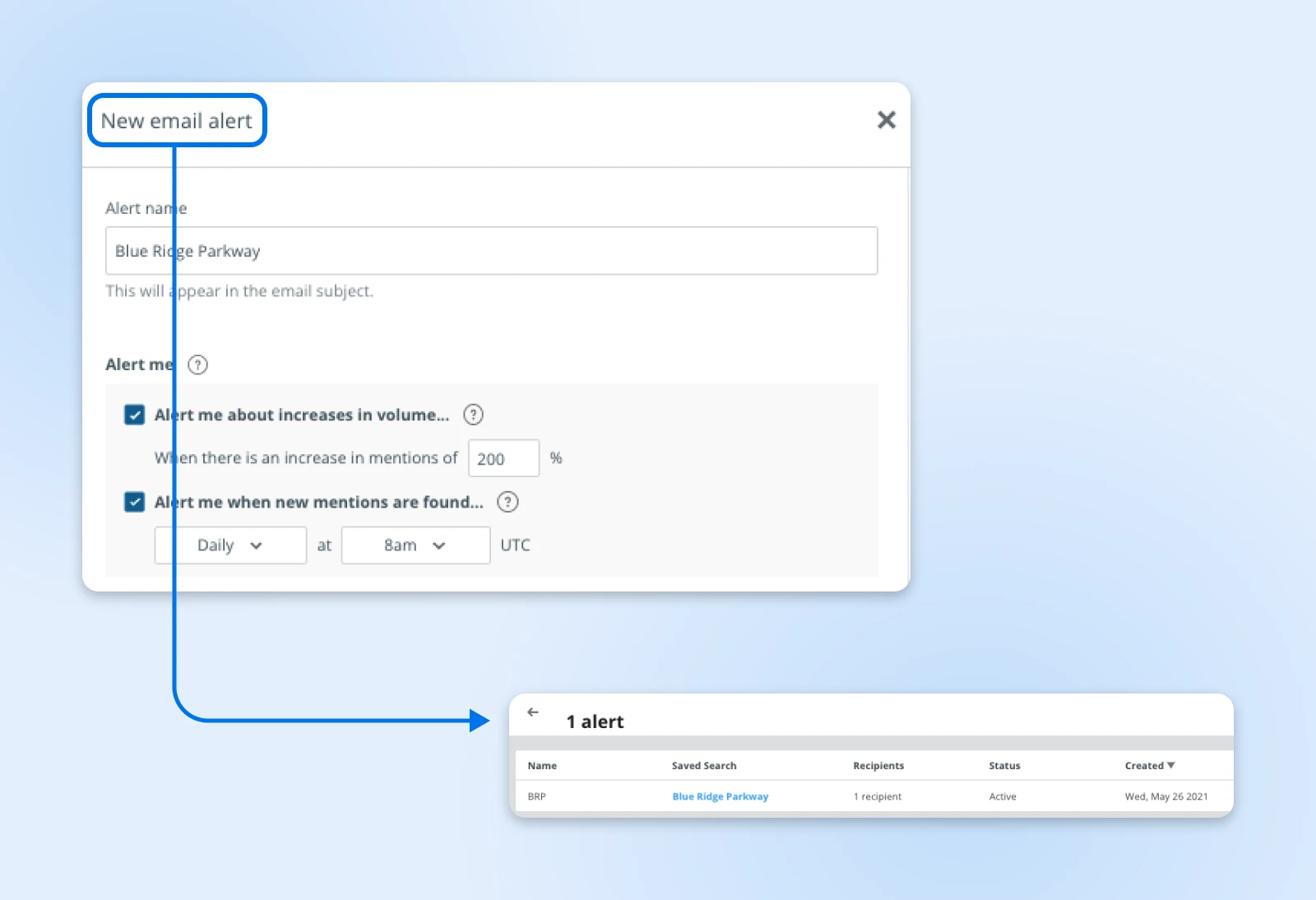
Tips:
- Configure keywords that include your brand name, product names, and common misspellings so you don’t miss anything.
- Engage quickly with both praise and complaints; a prompt, sincere reply shows your audience you’re paying attention.
Predictive Analytics and Recommendation Engines
By analyzing historical data, these AI tools can predict future customer behaviors — such as which products a customer is most likely to buy or which subscribers might cancel soon. They’re also used for personalized recommendation engines. Think Netflix or Amazon suggestions.
Predictive analytics help you market more effectively. This is the tool you use in that example we mentioned where, instead of sending everyone the same email blast, you can tailor offers to specific groups. Taking a targeted approach often leads to higher conversions and happier customers.
Popular Tools To Try:
- Salesforce Einstein: Built into Salesforce, this tool offers lead scoring, next-best-action prompts, and tailored marketing journeys.
- Adobe Sensei: Powers personalization across channels, analyzing user behavior to suggest optimized content or product recommendations.
Tips:
- Start with a small, measurable project (for example, predicting which customers might not renew a subscription) so you can understand how the tool’s insights affect real-world outcomes.
- Combine AI insights with your own intuition. Numbers can tell a story, but human judgment refines it.
The Human Touch (or: When Not To Use AI)
AI is incredible at multitasking and gleaning insights from data, but it can’t replace human warmth.
There are times when your AI tools won’t be the most effective way to build customer relationships. Use it to handle the busywork, and invest your renewed time in forming meaningful connections. A hybrid strategy gives you the best of both worlds:
- AI handles routine inquiries like “What’s your return policy?”
- Humans jump in for higher-level issues, personalized recommendations, and especially delicate customer concerns.
This setup prevents you (and your employees) from getting overwhelmed. At the same time, your customers don’t feel like they’re chatting with a cold, impersonal machine.
Below, find some examples of when you should leave AI on the bench and have a real person take the lead:
When You Need Emotional Nuance
AI has come a long way, but it’s not perfect at picking up on the subtleties of human emotion — especially in sensitive situations. Let’s say a customer’s dog just passed away, and you run a pet supplies store. That’s a moment requiring empathy and compassion, not just a scripted response.
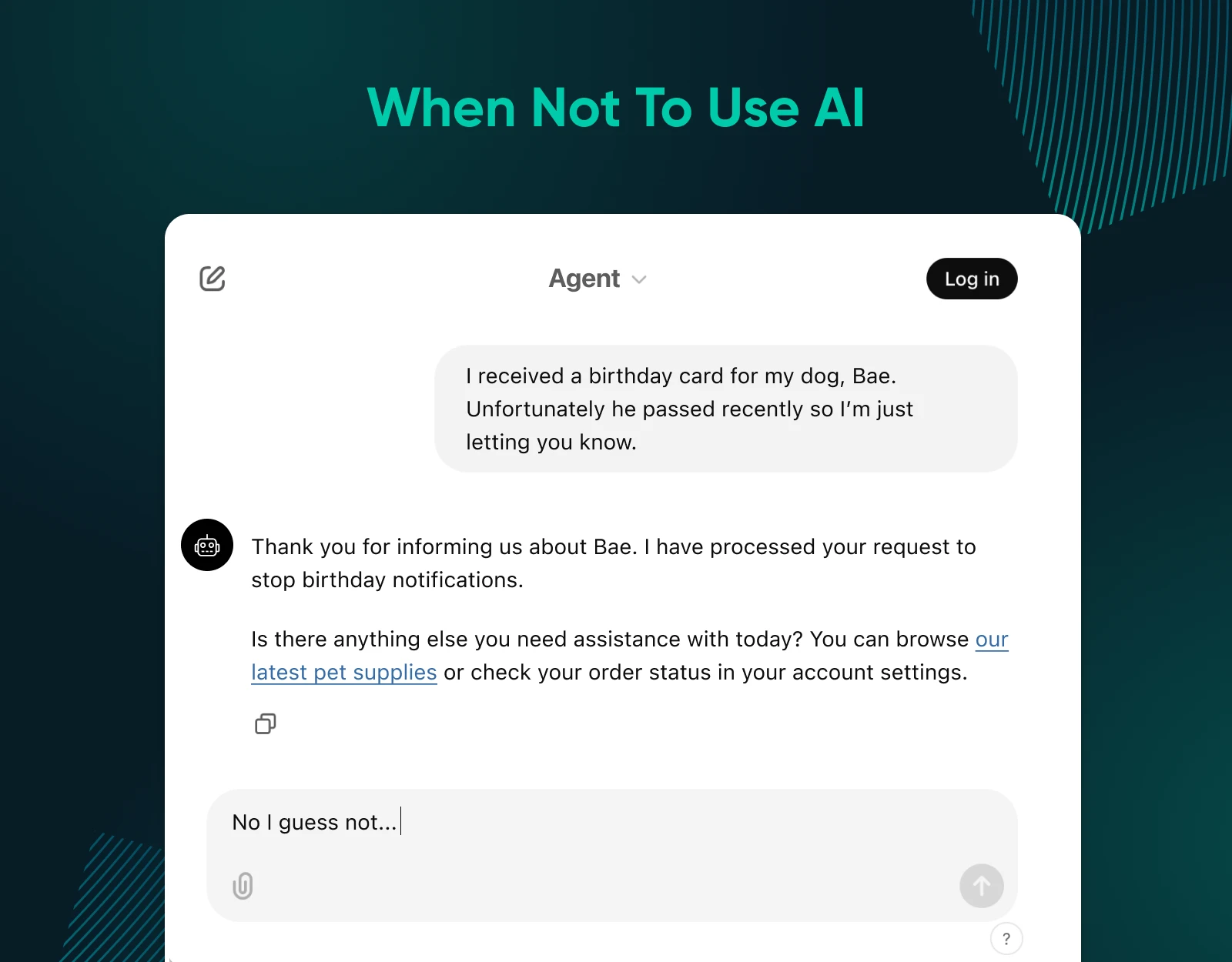
To Make Sure Your Brand Voice Stays Consistent
Have you ever tried to use a chatbot that sounded like it was churning out lines from a 1980s instruction manual? Yeah, not great.
Modern AI tools let you tweak the language style, so be sure to set guidelines that reflect your brand’s personality. Still, check in on the chatbot’s performance every now and then to ensure it’s staying on message.
When Data Privacy Is a Concern
Some small business owners worry about giving customer data to AI tools. That’s understandable. Look for solutions that comply with regulations like GDPR (for EU customers) or CCPA (for California residents). Reputable platforms will offer clear data protection features so you can assure your customers that their information is safe.
Build Better Customer Relationships With AI and DreamHost
As you work on customer relationships, AI can be a useful tool, but it’s important not to go from 0 to 60. Which area seems like your biggest headache right now? Customer support, data management, or staying on top of social media? Choose a single tool (like a chatbot or a basic AI-powered CRM) and start a free trial.
And as you explore ways AI can help you build and maintain customer relationships, be sure to set clear goals to work toward. Identify a specific outcome (like reducing your average response time by 50%) so you can measure the impact of your new AI initiatives.
Some more tips:
- Plan a gradual rollout for any new tools you incorporate into your strategy. Don’t try to automate everything at once. Focus on the tasks you dislike the most or that bog you down most often.
- As you track your results, you may need to pivot your strategy. AI tools are only as good as the data they receive, so monitor analytics, and adjust your approach as needed.
Yes, AI can seem intimidating, but think of it as a friendly team member who loves routine tasks and never sleeps. Handing over mundane processes to AI means you can be more present where it counts — chatting with your customers, testing new products, or just catching your breath once in a while.
Keep in mind that AI isn’t the only way to build better customer relationships. It’ll only work if you have a solid foundation — like reliable web hosting that keeps your site fast, secure, and online when customers need it. For that, check out DreamHost’s shared and managed hosting plans.
At the end of the day, customers want genuine connections. AI is there to streamline processes and free you up to deliver personal touches that keep people coming back for more. With the right blend of automation and authenticity, you can master customer relationships without feeling overwhelmed. And that’s a win-win for everyone.

AI Business Adivosr
Ready to Supercharge Your Business with AI?
Unlock the power of AI for your business with DreamHost’s AI Business Advisor. Included free with your hosting plan, this advanced tool provides personalized guidance on SEO, content creation, and website optimization. Start leveraging AI to drive growth and stay ahead of the competition today!
Get Started with AI Business Advisor

